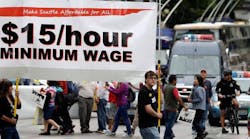OPINION: What Are The Consequences Of Raising Minimum Wage At Sea-Tac?
Aug. 28--The latest news is that the measure for a $15 minimum wage in SeaTac has been thrown off the November ballot. But assume it were there. Its passage would settle a question economists have been debating for 20 years: whether a high minimum wage puts people out of work.
Theory says it does. Make labor expensive, and employers will buy less of it. But economists have had trouble finding the proof.
In 1993 David Card and Alan Krueger compared fast-food employment in Pennsylvania, which had stayed at the federal minimum of $4.25 an hour, and New Jersey, which had raised it to $5.05 -- a 19 percent difference. They found that jobs increased faster under the higher wage.
Other economists looked at data on some of the same restaurants and found a small opposite effect. Economists argued over it and never agreed on it.
SeaTac Proposition No. 1 might have settled that question. Between Washington's minimum wage for 2013 and SeaTac's minimum for 2014 it would have opened a 63 percent difference. Add the provision for sick pay that could be cashed in, and the difference would have been 67 percent.
And this is off the current state minimum, which at $9.19 is the highest among the 50 states. (Oregon's is $8.95 and Idaho's is $7.25. British Columbia is at $10.25 Canadian.)
The SeaTac measure was limited to employees of airlines and certain airport contractors and concessionaires who are presumably tied to the monopoly power of the airport; and outside the airport to large hotels, car-rental and shuttle companies, large parking providers -- in all, 5,000 to 6,000 workers.
How would employers have adjusted to it?
The Cedarbrook Lodge at SeaTac has 104 rooms, which put it just above the 100-room threshold in Prop. 1. The hotel has 117 employees. Only four, the parking valets, are at $9.19, and they get tips. Labor is 70 percent of operating expenses.
Under Prop. 1, "our room rates would have to go up," said General Manager Scott Ostrander. The hotel is top-rated by TripAdvisor and the average room rate is $165. Ostrander was worried that the market wouldn't support the price increase he'd have to impose.
"We'd have to look at our entire staffing model," he said.
Frank Welton is general manager of the DoubleTree and Hilton hotels, which together have 700 employees and are union-organized. "You'd have to remodel the business," he said.
One place he'd look for savings is food and beverage service. The hotels have made savings already. They used to have four restaurants and now have two, one of them open only for breakfast.
Bob Donegan is president of Ivar's. Its restaurant inside the airport terminal, he said, pays an average $13 to $13.50 an hour plus medical, dental, optical and 401(k) with a 50 percent match. Ivar's would have a problem raising prices because is under contract to the Port of Seattle to charge no more in the airport than at its other restaurants.
How to absorb a higher minimum? Trim benefits? Donegan wasn't sure.
One thing, he said, "At $15, we'll get experienced cooks and servers from all over the region." There would be fewer openings for first-time job seekers.
Another change in the business model.
Now these decisions may not be necessary. But the issue is still out there. A $15 minimum has been brought up for Seattle. It appeals to people and would help some of them, but it would have consequences. Measurable ones.
Bruce Ramsey's column appears regularly on editorial pages of The Times. His email address is [email protected]
Copyright 2013 - The Seattle Times

